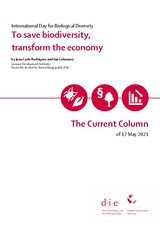International Day for Biological Diversity
To save biodiversity, transform the economy
Rodríguez, Jean Carlo / Ina LehmannThe Current Column (2021)
Bonn: German Development Institute / Deutsches Institut für Entwicklungspolitik (DIE), The Current Column of 17 May 2021
Every year on 22 May, the United Nations celebrate The International Day for Biological Diversity to commemorate the adoption of the Convention on Biological Diversity (CBD) in 1992. The CBD is the world’s most comprehensive treaty dedicated to saving nature. While it has successfully promoted the conservation of species in protected areas, the same cannot be said about the sustainable use of biodiversity by productive sectors. As biodiversity loss is still accelerating, the CBD and its state parties should urgently address economic growth.
Research over the past decades has assembled evidence for a strong correlation between global economic growth and biodiversity loss. More concretely, gross domestic product (GDP) growth is associated with land use change through intensified natural resource production and harvesting as well as with the expansion of cities and infrastructures, leading to monocultures and habitat fragmentation. Greenhouse gas emissions also increase with GDP and resulting global temperature increases drive many species into extinction. The expansion of global trade routes that accompany global economic growth provide ample opportunities for species to travel into distant areas where they compete with domestic species. Hopes that economic efficiency gains significantly decouple economic growth from resource use have so far not been met. In particular, there is no empirical evidence that absolute decoupling of resource use from economic growth could be achieved globally and at the rate necessary to prevent global warming over 1.5°C or 2°C. Significant relative decoupling – meaning that GDP rises faster than resource use – has occurred in China, India and South Africa. Nevertheless, resource use still increases globally, while biodiversity decreases.
In response to the persistent challenges associated with material growth, two recent high-level scientific reports call on policy makers to fundamentally re-orient economic policies: the Global assessment report on biodiversity and ecosystem services published by the Intergovernmental Science-Policy Platform on Biodiversity and Ecosystem Services (IPBES) in May 2019, and the Dasgupta review, a report commissioned by the British government on the economics of biodiversity, published in February 2021. Both recognise the need to overcome the limited focus on GDP by replacing it with more holistic measures that reflect the state of nature and quality of life. Moreover, they agree on the need for transformative economic change, which the IPBES defines as ‘fundamental, system-wide reorganisation across technological, economic, and social factors’. Required interventions include the elimination of biodiversity-harming economic incentives (e.g. agricultural subsidies), implementing environmentally friendly incentives, adopting precautionary approaches in resource management, and strengthening environmental laws and policies. Yet, both documents do not systematically consider alternatives to growth such as post-growth to address the sixth mass extinction. Post-growth advances that societies operate better without the demand of constant economic growth, prioritize well-being and collaboration and separates good (e.g. education, health) from bad (e.g. weapons, fossil-fuels, fast fashion) growth. There are many post growth futures and many ways of living post growth already exist. One of these futures is degrowth. If development does not follow on automatically from economic growth and degrowth is inspired by many contemporary practices in the Global South, the implementation of the concept is viable but would need to be democratically discussed – like it would have to be done in the Global North.
To support positive biodiversity futures, scenario development can play a crucial role. IPBES assessments operate with scenarios of the development of global biodiversity, assuming different future trajectories of economic, demographic, governance or related conditions. They have not so far considered post-growth or degrowth pathways, however. Doing just that might provide important opportunities to test and discuss profoundly different economic and ecological futures. Readjustments of alternative economic pathways may be needed along the way in the light of such debates. As countries of the Global North consider how to re-set their economies after the COVID-19 pandemic, this window of political opportunity should be used now to transform our economic system. At the international level, likely this October, parties to the CBD, will adopt a new strategic framework for the next decade and beyond. If this framework were to acknowledge the problems economic growth causes for biodiversity, this could provide an important normative reference point for the CBD’s state parties. At the German national level, with election campaigns in full swing, parties have to take a stand on the ‘greenness’ of their economic policies by not blindly pursuing GDP growth.



